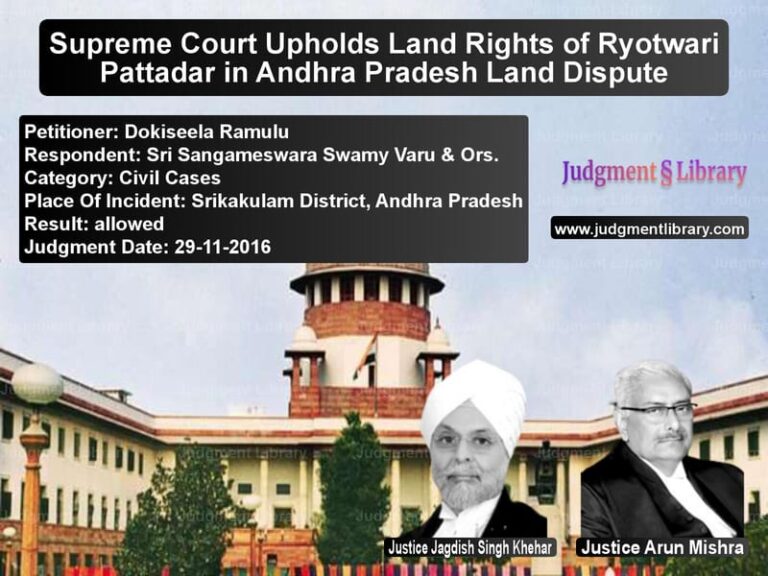Wildlife Protection Act and the Seizure of Turtle: Supreme Court Ruling on Jurisdiction and Identification Errors
This case involves a review petition filed by the Deputy Range Forest Officer against a judgment by the Kerala High Court. The High Court had quashed the criminal proceedings against the petitioner, Titty alias George Kurian, following the seizure of a turtle in the Erumely Forest Range under the Wildlife (Protection) Act, 1972. The issue at hand was whether the turtle seized was a species listed under Schedule I of the Act, which would invoke criminal penalties for illegal possession.
Background of the Case
On July 25, 2016, a turtle was seized by the Range Forest Officer in the Karumbanakulam region, allegedly found in the possession of Titty alias George Kurian. The species of the turtle was identified by the veterinary surgeon as an ‘Indian Flap Shell Turtle’ with the scientific name ‘Lissemys Punctata.’ However, the petitioner argued that the Indian Flap Shell Turtle does not appear in Schedule I of the Wildlife (Protection) Act, 1972, which prohibits the hunting and possession of certain wildlife species.
The Kerala High Court, after reviewing the facts, concluded that since the species seized was not listed in Schedule I Part II of the Act, the criminal proceedings against the petitioner should be quashed. The Deputy Range Forest Officer appealed this decision, contending that the identification of the turtle species was contested and required further investigation, particularly the legal classification of the species under the Wildlife Act.
Petitioner’s Arguments
The petitioner, Titty alias George Kurian, through counsel, presented the following arguments:
- Species Identification: The petitioner contended that the turtle seized was not the ‘Indian Soft-shelled Turtle’ (Lissemys Punctata Punctata), which is listed in Schedule I, Part II of the Wildlife Protection Act. Instead, it was identified as the ‘Indian Flap Shell Turtle’ (Lissemys Punctata), which does not appear in the list of protected species. Thus, the possession of this species did not constitute an offense under the Act.
- No Violation of Wildlife Protection Laws: The petitioner argued that since the turtle species was not included in the protected list, no offense had been committed. He highlighted that the Wildlife (Protection) Act only prohibits the hunting and possession of species included in the Schedule I list, and since the species seized was not listed, the charges were baseless.
- Factual Error in the High Court’s Judgment: The petitioner claimed that the High Court had made a factual error in its ruling, and the identification of the turtle by the veterinary surgeon should have been carefully scrutinized. The petitioner further argued that the wildlife expert’s opinion was insufficient to establish the legal standing of the species under the Wildlife Protection Act.
Respondent’s Arguments
The respondent, the Deputy Range Forest Officer, countered the petitioner’s claims with the following points:
- Jurisdictional Error and Legal Precedents: The respondent argued that the High Court had exercised its jurisdiction under Section 482 of the Criminal Procedure Code (Cr.P.C.) incorrectly by quashing the proceedings. The respondent emphasized that whether the species was included in Schedule I of the Act was a matter that could only be conclusively decided after a thorough trial, involving expert evidence and cross-examination of witnesses.
- Species Identification Should Be Decided in Trial: The respondent contended that the issue of whether the turtle was the ‘Indian Soft-shelled Turtle’ or the ‘Indian Flap Shell Turtle’ should be decided through a full trial. The matter, they argued, required expert testimony and evidence, and should not have been quashed based on a preliminary identification.
- Environmental and Legal Consequences: The respondent stressed the significance of protecting wildlife and enforcing laws related to endangered species, and argued that even the possession of a non-listed species could still have serious environmental consequences. They further highlighted the importance of upholding the provisions of the Wildlife Protection Act in safeguarding biodiversity.
Supreme Court’s Analysis
The Supreme Court critically analyzed the facts and the legal principles involved in this case:
- Identification of the Species: The Court noted the discrepancy between the scientific name of the turtle as identified by the veterinary surgeon and the species listed in Schedule I of the Wildlife Protection Act. The Court referred to the species ‘Indian Soft-shelled Turtle’ (Lissemys Punctata Punctata) being listed in Schedule I, Part II of the Act, while the seized turtle was identified as ‘Indian Flap Shell Turtle’ (Lissemys Punctata), a species that is not included in the Schedule. The Court acknowledged that the species identification was critical to determining whether the Act had been violated.
- Section 482 Cr.P.C. and Quashing of Proceedings: The Court examined whether the High Court had correctly exercised its powers under Section 482 Cr.P.C. in quashing the criminal proceedings. The Court held that the High Court’s decision to quash the proceedings on the grounds that the turtle species was not listed in Schedule I was incorrect, as the issue of identification and the legality of the possession should have been resolved through trial.
- Protection of Wildlife and Legal Compliance: The Court emphasized the importance of protecting endangered species under the Wildlife Protection Act and the necessity of legal proceedings to address violations. The Court stated that even if the species seized was not listed in Schedule I, the authorities could still investigate and prosecute violations involving other endangered species.
Supreme Court’s Judgment
The Supreme Court, while examining the legal points in question, delivered the following judgment:
- Quashing of the High Court’s Order: The Supreme Court set aside the High Court’s decision and directed the resumption of criminal proceedings. The Court held that the identification of the turtle species should be dealt with through trial, where expert evidence and cross-examination can determine the true species involved.
- Remand for Trial: The Court remanded the matter to the trial court to conduct a detailed investigation and inquiry into the species identification and the alleged offense under the Wildlife Protection Act. The trial would involve examining the scientific evidence and testimony from wildlife experts.
- Protection of Biodiversity: The Court underscored the need for strong enforcement of wildlife protection laws, noting that the protection of biodiversity is of paramount importance and must be taken seriously by both the authorities and the judiciary.
Conclusion
The Supreme Court’s decision in this case emphasizes the importance of thorough legal proceedings in wildlife-related cases, particularly when it comes to the identification of species and the protection of endangered animals. The ruling also highlights the need for courts to carefully consider expert evidence and to ensure that the laws protecting biodiversity are enforced effectively. By remanding the case for trial, the Court ensured that the facts of the case are properly examined before a final decision is made regarding the legality of the respondent’s actions.
Petitioner Name: Titty alias George Kurian.Respondent Name: Deputy Range Forest Officer.Judgment By: Justice Ashok Bhushan, Justice Indu Malhotra.Place Of Incident: Kerala.Judgment Date: 09-12-2020.
Don’t miss out on the full details! Download the complete judgment in PDF format below and gain valuable insights instantly!
Download Judgment: Titty alias George K vs Deputy Range Forest Supreme Court of India Judgment Dated 09-12-2020.pdf
Direct Downlaod Judgment: Direct downlaod this Judgment
See all petitions in Environmental Cases
See all petitions in Criminal Defamation
See all petitions in Damages and Compensation
See all petitions in Judgment by Ashok Bhushan
See all petitions in Judgment by Indu Malhotra
See all petitions in dismissed
See all petitions in supreme court of India judgments December 2020
See all petitions in 2020 judgments
See all posts in Criminal Cases Category
See all allowed petitions in Criminal Cases Category
See all Dismissed petitions in Criminal Cases Category
See all partially allowed petitions in Criminal Cases Category







